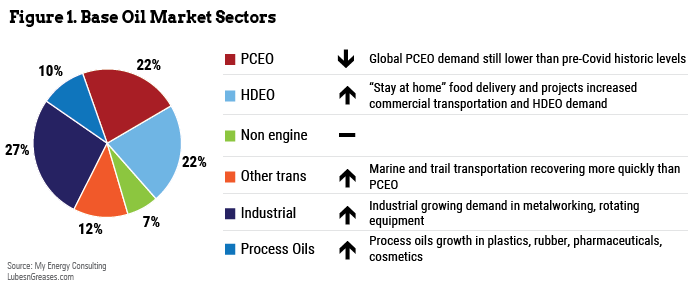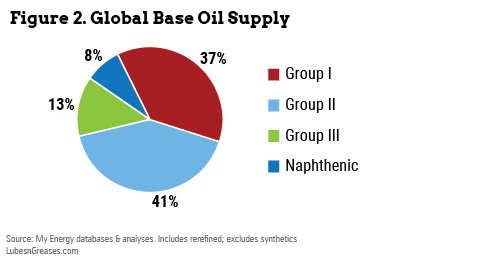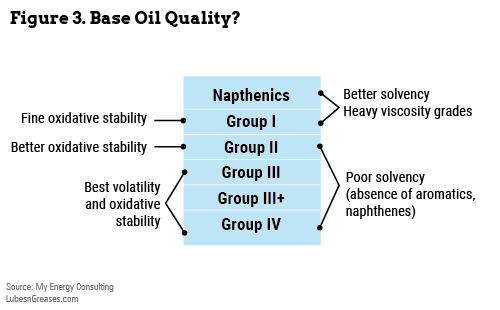
Regardless of the industry, employee knowledge is a key determinant for both business growth and profitability, said Amy Claxton, CEO of My Energy Consulting and Training.
“Tribal knowledge is waning in our mature industry,” she continued, “making it more difficult for new employees and new corporate entrants to the base oil industry to gain historical background, plus get quickly up to speed.”
Claxton—a long-time base oil industry player who got her start in the industry as a chemical engineer in ExxonMobil’s Baytown Refinery working on paraffinic and naphthenic base oil units—has an unmatched passion for base oil training, which is readily apparent to anyone who has participated in any of her all-day base oil training courses. When asked from where this passion stemmed, she explained she would often hear scores of questions asked after papers were presented at various ICIS Base Oil and Finished Lubricant Conferences that indicated there was a real need for increased base oil training. She felt even more strongly after starting her own base oil and wax consulting company after 20 years at ExxonMobil, when she began interacting with base oil clients from companies worldwide.
|
“Tribal knowledge is waning in our mature industry, making it more difficult for new employees and new corporate entrants to the base oil industry to gain historical background, plus get quickly up to speed.”
– Amy Claxton, CEO MY ENERGY CONSULTING |
Because of this, Claxton explained that ICIS and My Energy partnered up fifteen years ago to launch base oil training to address the ever-widening industry knowledge gap for new participants as well as companies that were new entrants into the existing base oils corporate world.
Base Oil Training and Pandemic Recovery Go Hand in Hand
As the base oil industry has begun its recovery from the infamous COVID-19 pandemic, Claxton said that base oil training is more crucial than ever. “It is critical in our post-COVID industry recovery to have a good understanding of base oil markets,” she said.

Furthermore, “recovery in base oil markets is disconnected from fuel products, such as diesel and gasoline, where demand fell more rapidly than most of the base oil market sectors,” she said. “It is also different within each base oil sector, since there is not just one ‘base oils market.’” See Figure 1.
Who Can Benefit from Base Oil Training?
The base oils industry is made up of a wide variety of company models, ranging from large multi-national, publicly traded companies to state-owned oil companies, mid-sized oil companies and privately held companies. “Seasoned employees at larger companies are often promoted from within and come from a fuels refining or chemicals background with no base oil knowledge and need fundamental training to get up to speed quickly in their jobs,” Claxton said.
Base oil knowledge is also required for employees well beyond those directly involved in base oil manufacturing, sales or marketing. Examples of these people include individuals who work in roles related to supply, trading and transportation of base oils. Base oil training is also vital for those working for lubricant additive companies and downstream lubricant industries, including industrial oils, transportation oils and greases. It can be a valuable tool for those involved in downstream process oil industries. These include tire, rubber, plastics, cosmetics and pharma, as well as food and agriculture applications.
Finally, base oil training proves useful for personnel involved in crude oil supply to base oil producing refineries, as there are simplistic misconceptions about “good lube crudes” being light and sweet, Claxton said. “As an example, Arab crudes are very high in sulfur yet give much better paraffinic base oil yields than sweet crudes like Brent, West Texas Intermediate and Cushing Domestic blended crudes,” she explained.
Understanding the Base Oil Groups
In today’s world, industry training is critical to understand both how and why the different American Petroleum Institute’s base oil groups continue to co-exist in our global industry, Claxton said.
The past two decades have seen a rapid expansion of hybrid fuels-base oil refining units, Claxton said. That is, base oils are being refined from upgrading fuels hydrocracker bottoms. This is possible in regions with lower conversion diesel hydrocrackers—Europe, most of Asia and the Middle East—where diesel is the most typical on-road vehicle fuel. Gasoline hydrocrackers are commonly used in North America and China, where consumer vehicles are more frequently powered by gasoline.
Hybrid processing joins traditional solvent refining processes as well as the original base oil hydroprocessing model most often used in the United States. This involves a dedicated base oil hydrocracker followed by base oil hydrodewaxing.

That said, Claxton is concerned about the industry’s use of the API Group labels. She said that she feels they have become mere marketing labels and that there is a general lack of understanding of their original intent as well as their technical definitions.
“New entrants to our industry need historical background and context before making assumptions about quality implications for each base oil group,” Claxton said.
She provided a bit of history on the API base oil groups:
- Prior to the 1990s, base oils were almost exclusively solvent processed worldwide.
- Base oils were categorized as “paraffinic” or “naphthenic” based on the type of crude that was used to make them. They were then differentiated based on their viscosity: light, medium or heavy.
- API base oil groups were developed to provide engine oil formulators with vital information regarding base oil interchange and substitution guidelines between different types of oils.
- There was originally no mention of refining technology—only viscosity index, saturates and sulfur.
- The base oil groups were not intended to imply base oil quality across all base oil industries.
Claxton often uses the graphic in Figure 3 to startle course participants when discussing API base oil groups. Rather than listing the base oils with the highest viscosity index and highest saturates at the top, she lists them in reverse order. “High VI and high saturates—often used as quality surrogates to indicate good base oil quality for the engine oils market—would be unacceptable in base oil markets which require solvency and very heavy viscosity grades to meet their quality needs,” Claxton explained.

Claxton makes the point that base oil customers across the various market sectors determine quality needs, as opposed to labels developed upwards of 30 years ago specifically for one subset of the global base oil industry, namely engine oils.
“Customers choose qualities to meet finished product specifications at the lowest total formulated cost, regardless of whether that customer is producing house paint, compressor oils, rubber carpet backing or automotive engine oils,” she said.
Take Time for Training
While it is clear that base oil training is valuable—and even necessary—for many base oil and lubricant industries as well as lubricant industry-adjacent professions, what seems less clear is where and when quality training is available.
That is where Claxton and ICIS come into the picture.
After a day of fundamental training, ICIS Base Oil Training—which was developed by Claxton—a more advanced and rigorous training course is available to cover the following topics:
- Base oil pricing mechanisms
- Global base oil supply by region, producer and API groupings
- Base oil supply and demand forecasting
- Base oil manufacturing economics and crude oil supply considerations for refiners in each region producing API Group I, Group II and Group III base oils
Claxton’s ICIS Base Oil training also covers future trends and disruptive technologies, which Claxton said is one of her favorite sections to cover. Current topics in this sphere include the following:
- Base oil impacts of increased electric vehicle penetration
- Gas-to-liquids processing
- Impacts of rerefining and bio-based base oils for biolubricants
- Unintended global base oil consequences of hydroprocessing versus solvent processing
The 26th ICIS World Base Oils & Lubricants Conference will be the first “in-person” global base oils conference since the onset of the COVID-19 pandemic. The conference is scheduled for June 26-28 this year in Windsor, United Kingdom, near London’s Heathrow Airport.
Claxton said that she is especially pleased to be teaching in-person again during the days leading up to the ICIS conference—June 23-24—just as she has been doing for more than a decade.
“In the past, learning ‘on the job’ literally meant learning from someone more experienced working in the office next to you,” she said. “In today’s very different post-COVID world, remote work-from-home models have created a difficult—if not impossible—environment for gaining industry knowledge.”

|
“I wear my branched reindeer antlers to represent and reinforce the importance of branched paraffins in base oil compositions.”
|
Base oil and lubricant industry players from around the world have been working to close the gap between employees and the knowledge that they need to possess to perform their daily duties. In an attempt to do just that during the chaos of the pandemic, ICIS has been providing online base oil training hosted by Claxton over the past two years. But while online training is relatively easy and convenient, it lacks the depth and interaction between participants that is provided by in-person training courses.
During the pandemic, Claxton often joked in her online base oil training sessions that she was wearing her “branched reindeer antlers to represent and reinforce the importance of branched paraffins in base oil compositions.” However, Claxton maintains that her unique choice of head attire doesn’t have the same impact from her office as it does in person.
Sydney Moore is managing editor of Lubes’n’Greases magazine. Contact her at Sydney@LubesnGreases.com